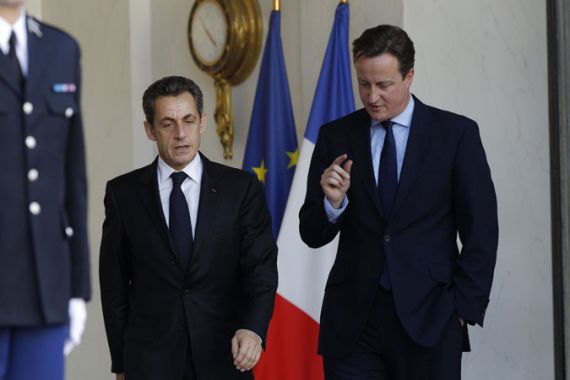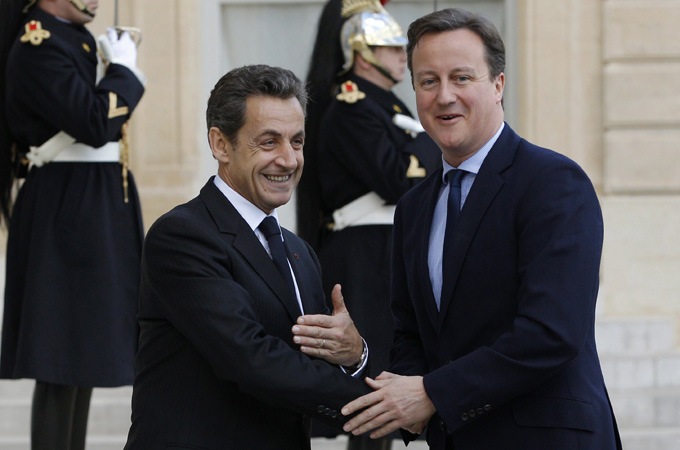Britain and France differ on eurozone future
David Cameron says UK will help eurozone solve crisis but does not think treaty changes are needed to save currency.

 |
| Nicholas Sarkozy,left, wants strict financial discipline to be imposed on countries using the single currency [Reuters] |
Britain is not convinced that the EU treaty needs changing to tackle the euro zone debt crisis, Prime Minister David Cameron said on Friday, after discussing plans for tougher governance in the bloc with French President Nicolas Sarkozy.
The Paris talks came ahead of a crucial meeting of European leaders next week about the future shape of the European Union.
Keep reading
list of 4 itemsBehind India’s Manipur conflict: A tale of drugs, armed groups and politics
China’s economy beats expectations, growing 5.3 percent in first quarter
Inside the pressures facing Quebec’s billion-dollar maple syrup industry
Sarkozy in agreement with the German Chancellor Angela Merkel has said a new treaty is needed to impose financial discipline on countries using the single currency.
But Cameron said steps could be taken to shore up the euro and improve the competitiveness of its weaker economies without treaty change.
Cameron said after meeting Sarkozy in Paris that the crisis was having a chilling effect on the British economy, and called for a successful outcome to a summit next week when the Franco-German plans will be put to EU leaders.
Britain wanted to help solve the crisis, he told reporters, but repeated his line that if treaty renegotiation turned out to be needed, any changes would have to be in Britain’s interests.
Under pressure from eurosceptic members of his Conservative party, Cameron has signalled he may try to use any treaty re-negotiation as an opportunity to wrest back some powers from Brussels to London.
However, he has said that the priority is to resolve the crisis, saying it would give a bigger boost to the struggling British economy that any other move.
Franco-German plans
Sarkozy and Merkel are pushing to give Brussels more power to enforce fiscal discipline in eurozone states, ideally through treaty changes that will be put to the make-or-break summit on December 9.
Merkel has said the eurozone debt crisis cannot be solved overnight, urging instead a long-term approach that relies on tougher fiscal rules in European treaties in a speech on Friday.
|
Al Jazeera’s Rory Challands reports on the eurozone crisis |
“The government has made clear that the European debt crisis can’t be solved in one fell swoop overnight. There is no miracle solution. There is no easy, rapid solution,” Merkel told the German parliament. “Resolving the sovereign debt crisis is a process and this process will take years.”
In laying out to the lower house of parliament plans she will take to a December 9 EU summit in Brussels, Merkel insisted the 17 nations that use the euro currency need to strengthen EU institutions and eurozone financial regulations.
“In order to win back trust, we need to do more, where we today have agreements, we need in the future to have legally binding regulations,” Merkel said.
The eurozone’s current budget rules have been violated about 60 times over the past decade by a number of nations – including Germany – but no country has been seriously punished.
To ensure that nations are keeping their budgets in check with the limits of the stability pact – deficits not more than three per cent of gross domestic product and overall government debt of not more than 60 per cent of GDP –
Germany is pushing for the right to take violators to the European Court of Justice.